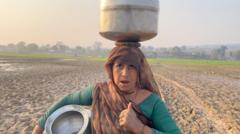Thousands in Madhya Pradesh protest the Ken-Betwa project aimed at enhancing irrigation and power supply, arguing it endangers their homes, cultures, and the environment, with fears raised over the submergence of vital regions.
Massive Protests Erupt Over Controversial River-Linking Project in India

Massive Protests Erupt Over Controversial River-Linking Project in India
The Ken-Betwa river-linking initiative faces backlash from villagers fearing loss of homes and livelihoods.
In a striking manifestation of communal resistance, thousands of villagers in Madhya Pradesh have taken to the streets to protest against the ambitious Ken-Betwa river-linking project, a multi-million-dollar initiative costing approximately 440 billion rupees ($5.06 billion). The project aims to divert excess water from the Ken river to benefit the drought-stricken Bundelkhand region, which covers parts of Madhya Pradesh and Uttar Pradesh, but critics contend that it jeopardizes local inhabitants’ homes and livelihoods.
Launched under India’s National Perspective Plan for water resource management, which dates back to the 1980s, the Ken-Betwa project has faced significant delays due to environmental concerns and political disagreements. Nonetheless, Prime Minister Narendra Modi laid the foundation stone for the project last December, with completion targeted by 2030. Proponents assert that the project will irrigate 1.06 million hectares of land, provide drinking water to over 6.2 million people, and generate 130 MW of renewable energy.
The project, however, poses threats to at least 21 villages and precious forest land; estimates suggest that it will submerge nearly 98 square kilometers of the Panna Tiger Reserve. Environmentalists warn that this could undo years of conservation, leading to irreversible impacts on local wildlife. A top court advisory panel previously raised questions about the project's economic sustainability and environmental consequences, urging officials to consider alternative irrigation methods.
Local villagers, many belonging to Indigenous tribes, express frustration over government assurances as they recite protest songs highlighting their plight. “The Ken-Betwa dam may bring benefits to others, but it drowns us,” lamented Mahesh Adivasi, a villager anxious about the future. The government has offered compensation options for relocated families, yet many criticize the amounts as insufficient, pointing out that they were undervalued regarding their homes and agricultural lands.
Despite assurances that 90% of villagers chose lump sum payments as compensation, ongoing ambiguity regarding relocation plans and timelines exacerbates their anxiety about an uncertain future. Critics furthermore question the government’s reliance on outdated data to justify the project’s viability, warning that its initiation sets a troubling precedent for infrastructure developments that could further marginalize indigenous and rural populations.
As protests continue, locals argue the development initiative promises progress for others while potentially further entrenching their poverty and disenfranchisement.





















